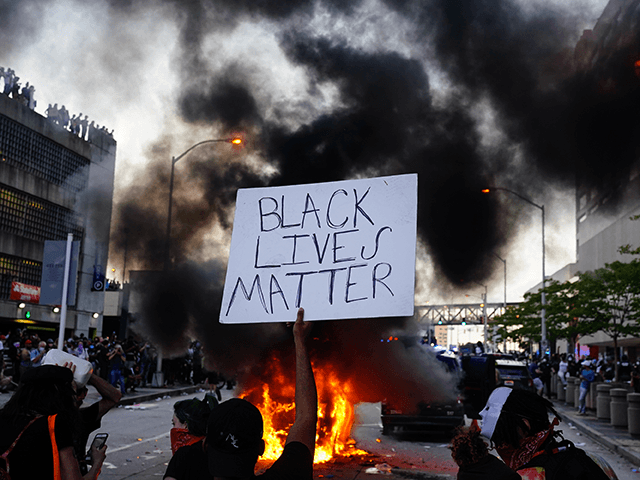UCLA professor Gordon Klein — who was suspended from the school’s Anderson School of Management for refusing to grade black students more leniently in the wake of George Floyd’s death — has filed a lawsuit against UCLA for harming his professional reputation.
Klein, who has been teaching at UCLA since 1981, was placed on leave last year in response to a student campaign that has called for his termination after he rejected a request to postpone a final exam for black students over the death of George Floyd.

A man holds a Black Lives Matter sign as a police car burns during a protest on May 29, 2020 in Atlanta, Georgia. Demonstrations are being held across the US after George Floyd died in police custody on May 25th in Minneapolis, Minnesota. (Photo by Elijah Nouvelage/Getty Images)
When the professor was asked to postpone black students’ exams, he replied by quoting Dr. Martin Luther King Jr.: “Remember that MLK famously said that people should not be evaluated based on the ‘color of their skin. Do you think that your request would run afoul of MLK’s admonition?”
Now, Klein is seeking compensatory damages, punitive damages, and attorney fees in a lawsuit filed Monday with a Los Angeles court.
“Plaintiff Gordon Klein, a professor at the University of California, Los Angeles, was severely punished by UCLA after he refused to implement a different grading policy solely for black students,” the lawsuit reads.
The suit also explains that the professor rejected a non-black student’s request to grade his “black classmates” differently, as he knew “that his employment contract — and California law — required him to apply the same grading standards and requirements to all students.”
After Klein’s email reply to the student was posted to social media, causing outrage among social justice warriors, “the Anderson School hastily buckled under this pressure and sought permission from the University to impose disciplinary sanctions on Plaintiff, including terminating his employment,” the lawsuit states.
And despite UCLA warning the Anderson School that “the School may not take any action — at this time,” administrators nonetheless “abruptly suspended” the professor and even banned him from campus, the suit adds.
Additionally, the suit claims the Dean of the Anderson School, Defendant Antonio Bernardo, “disparaged” Klein to both alumni and the general public based on the private communications between the professor and the student who requested “preferential race-based grading policies.”
“Dean Bernardo even went so far as to publicly disclose the adverse personnel action the School had improperly imposed on Plaintiff,” the lawsuit adds.
The lawsuit goes on to explain that after UCLA examined the facts, it eventually closed its investigation and reinstated Klein.
“Later, the UCLA Senate Committee on Academic Freedom criticized the Anderson School administration, noting that it had violated Plaintiff’s rights and, more broadly, that such conduct ‘chills’ instructors from expressing views that differ from prevailing campus orthodoxy,” the suit adds.
Therefore, Klein’s lawsuit is meant to not only “redress the wrongful conduct he has endured but also to protect academic freedom.”
The lawsuit specifies that the professor’s complaint is for “Breach of contract; violation of right to privacy by public disclosure of private facts; violation of right to privacy by placing plaintiff in a false light; retaliatory discrimination in violation of labor code § 1102.5(c); common law retaliation in violation of public policy; negligent interference with prospective economic advantage; and breach of employer’s statutory duty of political neutrality.”
You can follow Alana Mastrangelo on Facebook and Twitter at @ARmastrangelo, and on Instagram.

COMMENTS
Please let us know if you're having issues with commenting.